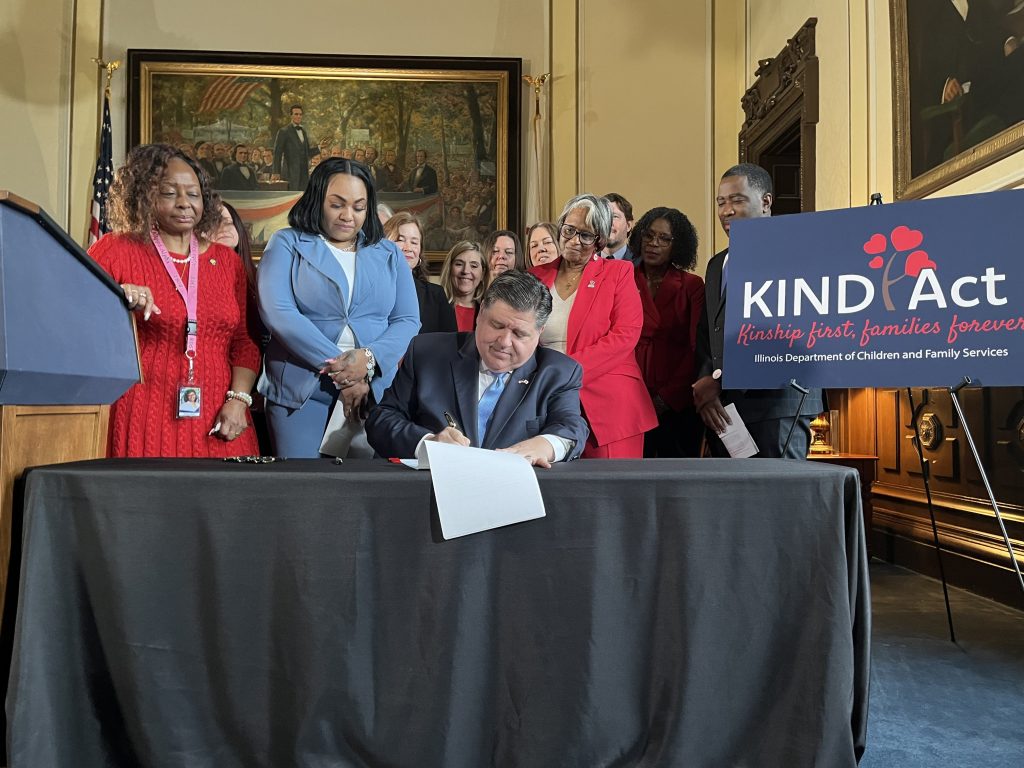
By BEN SZALINSKI
bszalinski@capitolnewsillinois.com
Capitol News Illinois
SPRINGFIELD — Foster care officials will have to prioritize placing children with their relatives under a new law signed by Gov. JB Pritzker on Wednesday.
Pritzker signed the Kinship in Demand Act, or KIND Act, at a ceremony at the Statehouse. The new law puts an obligation on the Department of Children and Family Services to use a “kin-first approach” when placing children in foster care.
Lawmakers and advocates said it’s better for children to be placed with a family member or another person close to the child when possible.
“Keeping these children safe and connected with relatives isn’t just smart policy; it’s the right thing to do,” Pritzker said.
Kin-first foster systems decrease the risk of abuse and create a higher chance of achieving permanent placement for kids, according to Casey Family Programs, the nation’s largest foundation focused on foster care. Most of the youth in DCFS care are already placed with families, according to Pritzker.
“It makes sure that we take into account the wishes of the young people that we care for and their families when we plan for their futures,” DCFS Director Heidi Mueller said.
DCFS will develop a certification policy for family members, which will allow them more access to financial resources for caregiving.
“The cost of raising a child is the same whether it’s done by a relative or a stranger,” Pritzker said. “The KIND Act allows DCFS to support relative caregivers by developing the certification standards specifically for them, ensuring the safety and well-being of youth in care, and allowing them to receive the same payment rate as non-family caregivers.”
Relatives will also have different criminal background criteria than other foster parents. The federal government allows DCFS to waive “non-safety-related licensing” for relative caregivers on a case-by-case basis. Relatives would still be subject to a personal analysis assessing their criminal record and its potential impact on the child.
Courts would also have a larger role in family-finding efforts like monitoring whether DCFS complies with notifying relatives that a child has been removed from their parents’ custody within 30 days.
Like most other state agencies, DCFS faced challenges during a two-year budget impasse that ended in 2017 and strained the system’s funding and ability to promptly place children in care settings.
The Pritzker administration ramped up funding for the agency, but former DCFS Director Marc Smith was found by a Cook County judge in contempt of court multiple times in 2022 for failing to find adequate placements for foster care children, some of whom were living in psychiatric hospitals longer than was medically necessary. An appellate court later vacated the contempt citations.
The agency has been the subject of some of the most intense criticism Pritzker’s administration has faced as governor, but lawmakers and advocates said Wednesday they’re seeing steps in the right direction for the agency since Mueller took over one year ago.
“I really do feel like we got it right this time because what the KIND Act is all about is keeping families intact,” Sen. Mattie Hunter, D-Chicago, said.
DCFS will now be turning their focus to helping kids transition from foster care to adulthood, Mueller said. This includes funding to expand services for housing for kids in foster care and improve planning for the transition to adulthood earlier in a child’s life.
“It’s an area that frankly we’ve looked at and we’ve recognized that there has been a gap in the support that we provide over time,” Mueller said.
Capitol News Illinois is a nonprofit, nonpartisan news service that distributes state government coverage to hundreds of news outlets statewide. It is funded primarily by the Illinois Press Foundation and the Robert R. McCormick Foundation.





